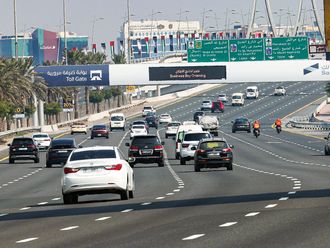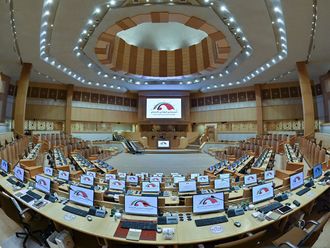
Abu Dhabi: The coronavirus outbreak may have deemed school unsafe for thousands of children, and positioned remote learning as a viable alternative to continue education. But after more than a month of the new systems, parents are complaining about the extensive workload for children.
Speaking to Gulf News, parents and students said they spend many more hours with schoolwork each day than when regular school was in session. And as the school term drags on, many are asking for an early end to it.
“My five-year-old attends live sessions every day from 9am to 2pm, and I don’t think they go very well. A lot of the time, there are connection issues, background noise and general confusion. Eventually, my daughter is unable to finish her work and has to work on the assignments till 6pm every day,” Akvile Sayf, 34, a Lithuanian marketing executive told Gulf News. Her daughter attends a British curriculum school.

“I am set to go back to work soon, and am also expecting a second child. I honestly don’t know how we will continue lessons then, especially as she needs my help to print out resources and upload her work,” she added.
Limiting COVID-19 outbreak
The UAE implemented remote learning in all schools and universities on March 22 as a means to physically distance children, educators and parents, and ultimately limit the COVID-19 outbreak. Schools were allowed to determine the mix of live sessions and offline assignments required to deliver content to students.
While the nationwide e-learning was greeted by parents, many have since complained about the way learning is organised, especially for younger children who need greater support to carry out tasks.
Ramadan responsibilities
A parent with children enrolled at an IB curriculum school said there are far too many live sessions during the week, and that these are especially difficult to manage during Ramadan.
“My eldest son is just in KG1, and he has had to attend two live sessions every day for the past month. Suddenly, four more weekly sessions have been added since the start of Ramadan. I have two other younger children to attend to as well. With Ramadan responsibilities, how are we supposed to keep pace with all the work being given?” said S.N., a Jordanian mother.
Working parents unable to find a balance
Another Bangladeshi mother said she has to balance her child’s learning while completing her work responsibilities.
“He is only in KG1, and there is simply too much work for him to do on his own. Because it is not a school environment, it doesn’t make sense to a four-year-old why he suddenly has to do so much learning at home, especially when he was never assigned homework before the remote learning began. So he is often reluctant to learn. In addition, the fact that he has to do these tasks alone, without having his peers to look at, is simply not motivating enough,” she said. The mother said she often has to work with her son in the evenings and on weekends to complete assignments.
Complaints across various curriculums
The complaints aren’t limited to one curriculum either.
Z.A., a grade 9 student at an Indian curriculum school, said it takes her until the evening to get all her work in order.
“I can’t fully understand why it takes so long, given that our teachers do spend quite a time explaining concepts to us. My guess is I end up spending a lot of time printing lessons and worksheets, and then uploading them later,” she said.
There are also other concerns, with parents saying that the learning is not engaging enough in certain subjects.
“Both my son and daughter finish their work quite quickly, but I’ve noticed that there are no lessons in subjects like Social Studies, and just far too much being assigned in Arabic. In addition, I do feel some of the lessons have been made simplistic,” said Santa Fonseka, 46, a content programmer from Sri Lanka.

Early end to school term suggested
Given the multiple challenges with e-learning, a number of parents, especially those with young children who are themselves working from home, said they would prefer an early end to the term, with the holidays adjusted later in the year.
“Children and their parents are stressed out enough, without having to manage the stresses of remote learning, Perhaps it would make better sense to finish the current term early, and shorten the winter holidays later in the year, when the outbreak is controlled,” Sayf suggested.








